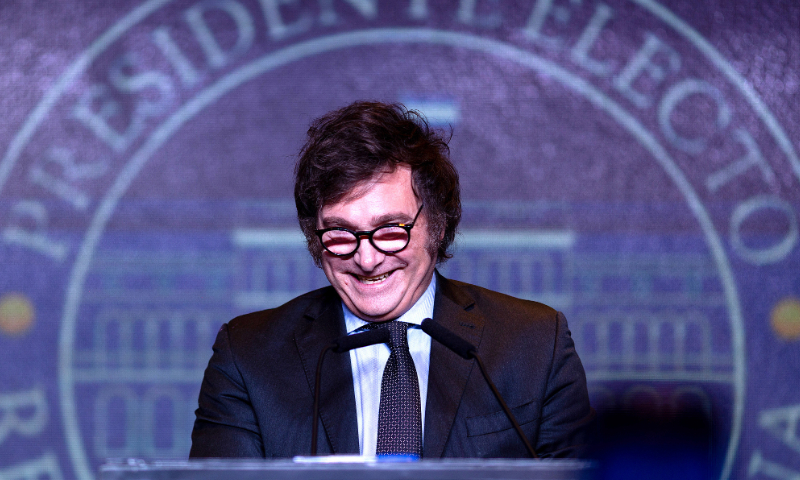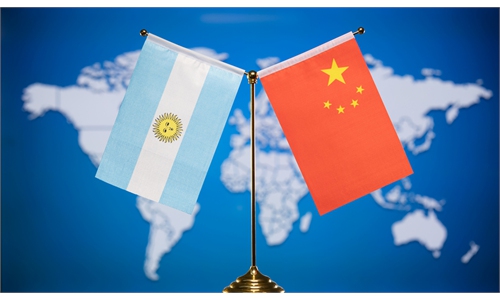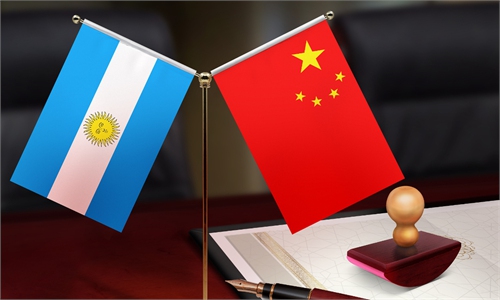Milei improving relations with the US doesn't have to antagonize others: Global Times editorial

Javier Milei Photo: VCG
Although the inauguration ceremony is still more than 10 days away, Argentina's President-elect Javier Milei has already embarked on a visit to the US. According to reports, Milei is scheduled to arrive in New York on November 27 local time for a "private visit" and will subsequently travel to Washington, where he will meet with officials from the US and international organizations over a two-day period. It has become the focus of observation whether Argentina, under Milei's leadership, will tilt fully toward the US and potentially "break away" from important trade partners such as China and Brazil, and what crucial information will be revealed during this visit.
Milei was propelled to the forefront amid a crisis. In the eyes of the mainstream economic community, Milei's campaign viewpoints, including those of "blowing up the central bank," abolishing the peso and for Argentina to use the US dollar instead, and his "chainsaw" plan to trim state spending, are considered somewhat unorthodox. However, it is essential to recognize the severity of the challenges currently faced by Argentina, the second-largest economy in South America: an inflation rate soaring to over 140 percent, the official exchange rate of the peso against the US dollar falling below 350:1, and the central bank's net reserves plunging to more than a negative $10 billion. Four out of every 10 people in Argentina live below the poverty line, and more than half of the population requires some form of social assistance or support. It can be said that Milei's rise to power reflects the urgent desire of voters in Argentina to swiftly overcome economic difficulties.
As the British magazine The Economist pointed out, Milei faces a far trickier economic situation than any American president since the Depression. Consequently, public opinion has noticed that during Milei's visit to the US, in addition to meeting with US diplomats, he is placing a strong emphasis on meetings with officials from the US Treasury and the International Monetary Fund. At the same time, among Milei's entourage is financial affairs advisor Luis Caputo, who is also seen as a potential future cabinet member. Although Milei's team emphasizes that this visit is "not seeking financing," it is evident that Milei hopes to alleviate Argentina's economic difficulties by strengthening ties with the US.
As a sincere friend of Argentina, China also hopes that Argentina can quickly overcome its current challenges and embark on a better development trajectory. If the US can indeed provide assistance to Argentina, helping it to recover economically and allowing the people to enjoy more well-being, this is something that the international community, including China, is pleased to see.
But it's questionable whether the US will actually do so. In Latin America, there are many examples in which countries fully align with the US but don't receive any real help. Argentina itself has also suffered from this. For example, in the 1990s, Argentina's Menem government attempted to fully open the country's financial system to the US, but this effort failed to result in genuine assistance from the US. Instead, due to the consecutive interest rate hikes by the Federal Reserve, Argentina's external debt became unbearable.
There is another important issue to consider here. In recent years, governments that have shown friendliness toward the US are often automatically categorized as unfriendly toward China. Why has this impression been formed? It is worth pondering. The circles of friends of various countries should not be mutually exclusive. Milei hopes to have a good relationship with the US, but it should not and must not be based on the premise of antagonizing other countries. Ultimately, this is the result of the US overtly and covertly pressuring other countries to take sides. In the past, the assistance conditions proposed by the US to Argentina included excluding or restricting Chinese investment. This is not helping Argentina, but harming it.
Previously, some people intentionally hyped up the claim that Argentina would "decouple" from China and Brazil, but even some rational Western experts were not optimistic about this gloating. In fact, although the political spectrum of Latin American countries swinging between left and right has not fundamentally changed, the relationship between China and Latin American countries has shown a trend of increasing stability in recent years. Former Argentine President Mauricio Macri initially questioned the development of relations with China, but soon realized that "developing our [Argentina's] relationship with China is particularly important." China and Argentina had close interactions during his tenure. Brazil, Argentina's neighboring country, had a similar experience during the presidency of former president Jair Bolsonaro. This is because China's pragmatic cooperation with Latin American countries, including Argentina and Brazil, has brought tangible benefits to the people of both sides.
Many public opinions have noticed that compared to the "radical" stance during the campaign period, the attitude of the Milei team has softened after being elected, especially in their attitude toward China and Brazil. Diana Mondino, widely expected to be named foreign minister by Milei, recently stated on multiple occasions that Milei's remarks were "misread" and that it is a huge foreign policy mistake for Argentina to cut relations with China and Brazil. Milei himself had previously urged Argentine business executives to "keep doing all you want (doing business with China)." This "change" is not surprising. China is Argentina's second-largest trading partner and the largest market for agricultural product exports, while Brazil is Argentina's largest trading partner. In the process of overcoming Argentina's difficulties, the logic and interests of the Milei team and the Argentine people in developing relations with countries like China and Brazil are aligned.


